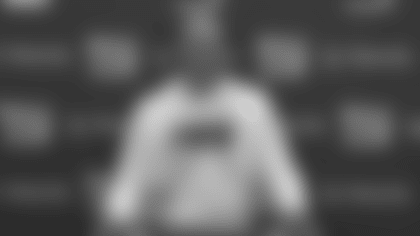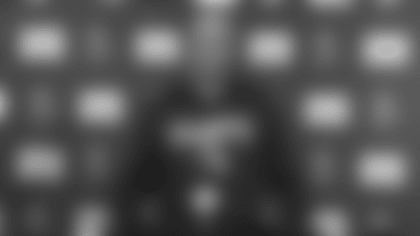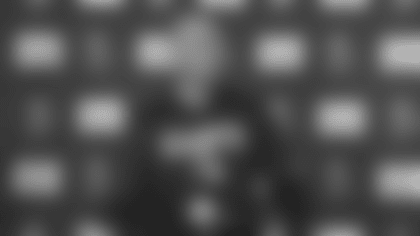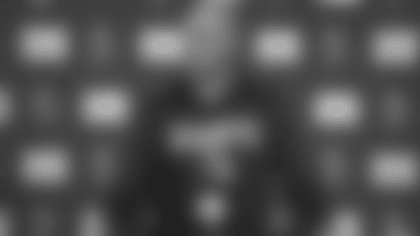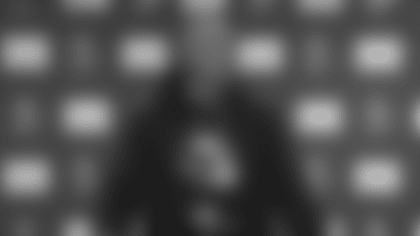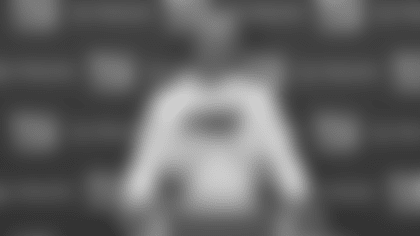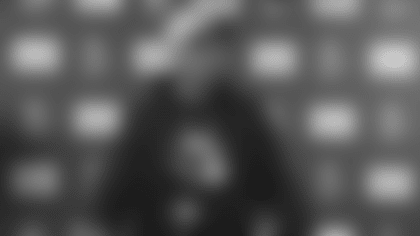Several assistant coaches met with the media on Friday in a video chat press conference. Here is what the coaches had to say.
Outside Linebackers Coach/Senior Assistant Bret Bielema
Q: For someone who was so engrained in college football, you know what life is like on campus. Wisconsin and Arkansas and things like that. What do you think your colleagues are going through, those campuses are going through? Fall without football, what do you think of that?
A: I would say I still have a lot of friends in that line of work. We're all coaches at heart and there they kind of started going through it a little bit earlier than us. I think some of them got the jump on zoom meetings and all the interaction that you had to go through during this process. It's probably been more interactive between college and pro than any other time. When I was in college football, I would go to OTA's during the spring, but I didn't really interact with NFL head coaches or NFL assistants because your seasons were at the same time. Also, they kind of overlapped in a way you didn't really professionally develop with them. I think everybody is learning as they go through this thing. I think there has been a big learning curve from players and coaches and everybody involved.
Q: You have been a head coach for a lot of games for a couple of high-profile college teams. You worked with Joe Judge for a couple years in New England. Could you see he was on track to be a head coach? What do you think will ultimately make him a successful one?
A: Obviously you guys have talked to him. I knew Joe Judge's name before I went to New England and then obviously during my time there over two years. The first meeting I sat in front and he was going over details that Coach Belichick would give him, just very impressive to realize the football presentation awareness. His voice, his demeanor, it was very intriguing to me. I know he has a special teams background and interests. To hear that firsthand and then get around him and see the general football knowledge that existed. On a personal note and the way he is as a father and the way he interacts with his colleagues and coaches and players, you know he had big things in front of him. I'm very excited to be here with him.
Q: Obviously right after you got hired, you were linked to a couple openings for college head coaching jobs. Can you just explain what that process was like for you?
A: During even my time in New England, I've been a college coach in the past. There's probably a lot of things that you read that may or may not be true or be true and not be true. One of the obligations that Joe was very cool with me coming in was if an opportunity arose for me to pursue a college football opportunity, he was behind it one hundred percent. Obviously, it happened a lot quicker than he or I ever thought. The biggest thing is life throws different opportunities, Joe has been very supportive. From day one, I told him I wanted to be a part of what we're doing here. Who knows that the future holds? Just take it every day for what it is. Try to take full advantage of it for the New York Football Giants and see where it goes.
Q: Did you come close to getting any of those jobs? Is college something you ultimately want to get back to? Eventually do you want to be a head coach in college?
A: I got a very wise advice when I was an assistant coach with Hayden Fry. He said there is two types of coaches, coaches that try to look to their next job or coaches who take advantage of the opportunity they have. I try to live that life not only as an assistant, as a coordinator, as a head coach, but now as a NFL assistant coach. Now with this opportunity with Joe, I just try to be the best I can be every day. However I can help our staff, however I can help our players. As that grows and opportunities come, you just have to process them as they go. I don't really know where it's going, don't have a great plan. I'm just always trying to be active and proactive and do the best job where I'm at.
Q: With the guys you have in the building, you have a lot of young guys you are coaching. What is your impression even beyond Markus Golden, there's three young guys, Kyler Fackrell, Lorenzo Carter and Oshane. What's your impression of those guys?
A: They are all very impressive. I think as a group we always talk about OLBDNA. What we are and what we represent, when we're there, when we're not there. They have been a good group do work with. There isn't any true all-stars, just guys who show up to work every day. They have a blue-collar mentality. They represent the New York Giant blue really, really well. They are hard workers. I'm not saying they aren't going to be stars or superstars, but they are guys that are working the process. We have two rookies, that's probably why my voice is the way it is. Trying to bring them along on a daily basis. Joe and the personnel department have done an outstanding job of giving us a good group of people to work with. It's just fun to come to work every day.
Q: Given the various forks your career path could have taken this offseason. You look at what's happening in college football right now where most of the teams aren't going to be playing. How fortunate do you feel that you didn't accept one of those potential offers where you would have been not even coaching this fall?
A: When I got into this profession almost 27 years ago, I didn't ever have a goal other than to do the best job in front of me. The path that we took together, my wife and two girls, we take every day for what it is. When Joe presented this opportunity to be with the Giants, I jumped at it. As things evolved here, he worked with me to do anything that came up I was interested in doing. All I'm doing, is I am very happy to be here. This is such an unusual time in everyone's lives. Everything you are going through from COVID, the transition of you are talking to college football. All you can worry about is today. That's really all I am trying to do. Get better as a outside linebackers coach, help Joe any way that I can and be best that we can every day at work.
Q: I'm sure you still have a lot of friends in college football who are coaching. How are they dealing with the day to day challenges of not having a season or maybe having a season?
A: I wish I knew. We had a four-week break in the summer where we actually transitioned here to New Jersey. My wife and I transitioned to New Jersey. We were transitioning from another home to this home. I had time to catch up with a few buddies via phone or via zoom. A little bit unusual that you don't travel, I have a three-year-old and one year old, that really restricts your travel. During the summer, we didn't know what was going to happen. Since these announcements started happening, coach Alvarez and I talk quite a bit. I have people all over the country that I engage with all the time. Since we started four weeks ago, I have not talked to a college assistant coach about what they're going through. You get up really early in the morning here, you go to bed really late, never watch a stich of football news or anything like that. Really because you are in professional football, you don't watch as much social media as you watch when you are in college football. I find out more from my wife in a 20-minute conversation at night than any other time of the day.
Q: You mentioned coaching two rookies, I assume that's Carter Coughlin and Cam Brown. We haven't been to practice yet, are those the two you are talking about?
A: Yeah, they have been a lot of fun. Both of them are Big Ten guys. Two different kinds of guys. Carter played on the line of scrimmage, did a lot of things on the edge at Minnesota. Cam was an edge to air player, he was in space a lot. A very long player, Carter is a little bit more of an on the line of scrimmage linebacker. It's been fun. Both uniquely different but both great to work with on a daily basis. What's impressive to me is the way the vets have responded to them. You knew they were going to respond to the vets, but sometimes the vets aren't as reciprocal. All four of our veteran players do everything they can to make them better. It really makes our room pretty cool.
Q: You mentioned earlier in a previous answer and I thought you said "OLBDNA", is that how you referred to it?
A: One of the things that I have always kind of talked about is everybody knows what DNA is right. DNA is something that is in you that describes who you are, and it's built every day, you are given it at birth. As an outside linebacker group, we try to do things to establish who we are to the outside world. To our teammates that play around us, to our teammates that are in the room with us. We just kind of always stress and that's a big part of what I try to get to the group. Hopefully it's positive DNA. I know DNA can have a bad connotation. We are trying to have positive DNA.
Q: Can you describe your philosophy and what you preach to your guys. What an outside linebacker needs to be?
A: First and foremost, to respect the game. I think that's a big part of it. We have three things that we hold tangible. The process that makes up that DNA to be consistent. We're playing on the edge, we are outside linebackers, so you have to have great edge awareness. Then football IQ and situational football always have to be big. If I have a group of guys that maintain those three things, we have a chance to be successful and hopefully give Pat a tool as a coordinator. Give our program a tool as an outside linebacker group and fit into the group of players that we take out on Sunday to have a chance.
Defensive Backs Coach Jerome Henderson
Q: Outside corner position. I know you have a bunch of guys at corner, but who realistically is competing on the outside right now? Obviously, we haven't been able to see you guys on the field yet.
A: All those corners are competing. Right now, we don't even have a true depth chart. We call it an alignment chart. It's just where you're aligning for that practice or that drill. Everybody is going to get a chance to compete.
Q: So (James) Bradberry isn't starting? Ok good, thanks.
A: Above my pay grade. But everybody is going to compete and have to compete. That's just the way it is in this program. Joe's made it very plain to us that everybody competes. Nobody is given anything. Even Bradberry has to go out and compete.
Q: Let me ask you about a specific guy then. Darnay Holmes. Do you think he's versatile enough, I know he played outside in college, but has he shown you things that demonstrate he can do that at the NFL level?
A: We're cross-training him right now, outside and inside, as all our players are doing right now. He's doing a good job in camp, but he has a long, long way to go. We haven't even gotten to the pads yet to really see. That'll be when you can really see what you have in those guys, is when we put the pads on and it's a little more competitive, it's real and he's going against guys. Right now, we've just been in shorts. He's been positive, doing some positive things. He has some growing to do. But we'll see what he is when we put the pads on and actually compete against each other.
Q: You were a defensive back player years ago. I'm just wondering, some of that experience that you gleaned, how much of that can you carry over? I know the game changes with each new generation. I'm just wondering if that's been an advantage for you in coaching these young players and how they've taken to those tips and stuff?
A: I think it's an advantage because a lot of the things I'm coaching, I've been in that situation before. I always want to be a coach who can help my guys find answers and teach them on, 'Tell me what you were thinking right there. Maybe you can pick up in a different way.' So, I try to be that coach who, again, is going to provide answers and give them things that they can to do help themselves. We play a really tough position. The guys we play against are super, super talented. They know where they're going, we don't. We're always trying to figure it out, react, cut them off and defend them. It's a hard job. As much wisdom as I can impart, as well as instruction, I try to do that.
Q: Along those lines, cornerbacks and safeties, as we know them years and years ago, they become more diverse if you will. There are more and more things that they're asked to do. I know you have a bunch of guys in your group that are very diversified and whatnot, like Jabrill Peppers, Julian Love. Can you just talk about that diversity and just how that's going to fall into play?
A: If you watch this system of defense, you'll see that the parts are really interchangeable in the secondary. You'll have safeties sometimes moving down and playing corner. You'll have corners sometimes moving back to play safety. We're asking all those guys to be versatile. We're asking them to learn multiple positions. That gives us flexibility because I always tell them that one week, especially when you have COVID in the mix and what can happen there, you may have been at corner all of camp and the next thing you know, we have an injury, another guy is out because of COVID, next thing you know, you've switched positions midweek and we play in a couple of days. We're trying to get guys kind of cross-trained and to be ready for when that happens, if it happens. We are asking them to cross-train and learn multiple spots.
Q: Along those lines, is there a fine line between versatility and really honing in on a defined role?
A: Yeah, you'd like to be able to say, 'Here's home' and start there. That's what we're trying to do, is give them a place to start. 'This is home. Make sure you know this. But also, keep your eyes on this.'
Q: You've been in a bunch of different systems. Are Pat's (Graham) schemes unique in that respect that he put so much emphasis on versatility?
A: Again, I think the biggest thing in the secondary is communication. We need to have guys who can communicate and talk. We should be a loud defense, especially now when you don't have the fans and the crowd noise. We should be a defense you hear talking a lot, communicating, and helping each other play, like the thought process. Only one of us has to remember a certain tip or alert. If one of us can get it, we all should get it. That's been a big point of emphasis and that's where my group needs to grow and become communicators of information.
Q: I know we asked you about Holmes. I'm just curious about McKinney and what Xavier has shown you so far? You said about guys taking control vocally. I get the sense that he's not a guy that you have to tell twice to kind of be out there and be that alpha dog. Have you seen that from him so far, and what do you expect from him early on here?
A: Just like all young players, there is going to be a growth curve with him where he's adjusting to our communication system, our way of doing things, which is a little bit different than his at Alabama. But the thing you know about the kid, he loves football. He has a lot of natural ability that you guys all saw when you studied and watched him coming out. We're excited to have him in the mix, again, learning those multiple spots, honing in on one spot. You hope that he just continues to grow. We're going to really push him hard to make sure that he continues to grow and become one of those communicators for us on the backend. The safety position is the one that kind of sits back and sees it all and talks down to what's beneath them. We're certainly going to ask that of him.
Q: Does he have it in him?
A: Oh, absolutely he does. He's a great kid. Again, he's a young kid. Right now, we're putting a lot on him to make sure he's detailed and he learns it and he does it exactly like Pat wants him to do it. We're working with him on that. But yeah, absolutely, we're happy to have him here.
Q: Just wanted to ask you about another guy, one of the few who is returning, Corey Ballentine. How did he kind of process reviewing tape from last year with you as far as how he can grow as a rookie? Has he shown you anything mentally, or like you said, you've been in shorts only, but has he shown you anything that he can take a step off of how he started?
A: The thing that I appreciate about Corey is that he wants to be coached. He has come to me and said, 'I want to be coached. I want to know, and I want feel like I can go out there and play confident.' I'm making sure that he feels confident when he goes out, giving him instruction, and making sure that he can give it back to me. He's a guy who has some ability. He's in the mix, just like everybody else is, to play a big role for us. I'm excited to work with him.
Running Backs Coach Burton Burns
Q: What made you want to make the jump to the NFL after such a long career in college? What are the differences in coaching college players, you have obviously coached a lot of talented ones, and coaching an NFL player? Now with Saquon, you are coaching a very talented one but one who is a little further along in his career.
A: Well as far as the first question about making the jump, I think the situation created itself for me. I have a relationship with Joe Judge. As you go through your coaching career, you just start coaching and I think in the beginning of your career you have ambitions to do certain things. One of my long-time ambitions was to coach in the NFL. As you go through your career, you wake up from year to year and do what you're supposed to do. Do what you do well where you're at. I think the biggest part was Joe Judge giving me the opportunity. It's something I wanted to do personally, to be in the NFL. Knowing Joe's personality and our relationship, it was kind of like I wanted to see if I could come and help him do his thing. As far as the differences between the college and pro athlete, the way I have always looked at it is that players are players. I know they are at different levels, but the one ingredient that most really good players have, they are very competitive. They have a competitive nature so as far as coaching those guys, they always have the desire to continue to develop. I've seen that with Saquon. He has a competitive nature and the guy is always interested in developing his craft to the next level. My approach has not changed with that because it's always about development. I think football in general is a developmental sport.
Q: I know you haven't coached the running back position in a couple years at Alabama. Was the chance to coach Saquon a factor to come to the Giants?
A: Yeah, it was. It didn't hit me at first. At first, it was Joe calling me, and oh my goodness here's this situation that I have to make a decision on. It didn't take me long to make the decision, I promise you that. I realized I had the opportunity not only to coach Saquon, but pro football players. We have some other good guys on the team and at the position. Wayne and Dion came along. I think Eli Penny has special talents as a dual player, as fullback/running back type. Just that opportunity to coach guys at the professional level. I have to tell you, I got some encouragements from some different guys that have coached pro ball. I lean on them for some assistance as far as making decisions. It just happened.
Q: You talked a little bit about your relationship with Joe and wanting to come to New York and help him. When you look at Joe, what makes you believe he will be a successful head coach? Just your thoughts on this unique circumstance and how he's handled it.
A: First of all, I always thought, when Joe was with us years ago, he was very bright, very articulate. He was dutiful in doing the assignments he had on our staff. I expected it from him from that standpoint. The other thing about Joe, we always knew he was organized. Especially in the situation we are in now, it takes an organized person to navigate through all the challenges that we have to face day to day. I'm not surprised by the way he has handled it. He's very meticulous about doing the little things, despite the big picture that's going on. Joe has always been good at organizing things like ABC. We are going to do this, we are going to do that next, do this first in order for the next thing to work. I think that's what we are doing here in this situation.
Q: You mentioned Eli Penny. What can he be for your team and your running back room? What has he been as far as not only a veteran but what he can do on the field and his versatility?
A: First of all, Eli has a great personality. He is infectious throughout the team. I think guys look up to him, he's a go-getter. He's got this attitude: I'll do whatever it takes. He's got a unique ability. He's primarily a fullback, if you will. As you noticed last year, he was able to get in some one-back opportunities and do those things. I think the biggest thing with Eli, he's got great leadership qualities. He's got a great personality and the whole locker room loves Eli. Just because of his attitude and his desire to do the right thing for us to be successful.
Q: You came to Alabama when Nick Saban got hired there. Do you see any similarities from the way Nick runs his program and when you have been around Joe with the Giants?
A: Both of those guys are very organized. There are certain steps that you have to take the first year you are trying to build a program or rebuild a program. I see Joe basically taking those same steps. I remember I went with Nick in 2007 and it's like déjà vu. It's not because Joe is copying Nick but that's how good football coaches who are organized create a different environment for a brand-new team.
Q: Looking back over your history, you have developed some really impressive running backs in your coaching career on the college level. I know running backs come in all different shapes, flavors and sizes. What's the one common thing you have found that every good running back has or ultimately develops for success?
A: First of all, these guys were blessed with some physical ability. I think the other thing is, I mentioned it earlier, by nature they are very competitive. They want to be better than everyone thinks they are. They want to put the extra time in physically and mentally to try different things. They always want to (ask) how can I do this better, what about this, what about that. The one ingredient in really good running backs as well as really good football players is that desire to continue to get better. That's been a common theme with these guys.
Q: If I could just ask you about Wayne Gallman. He is a guy who kind of disappeared off the radar last year. I know you weren't here last year, but can you tell us what you have seen from Wayne Gallman so far?
A: I see a guy that's coming to work every day, that's working really hard. Again, he is very interested in improving. I had a history with Wayne as far as we competed against his team in college. I kind of followed his career, I knew him a little. His personality is like all the players that I've coached. He's got his competitive nature. I know I'm overusing that word, but it keeps coming up. He's also got that 'what can I do to get better (mentality)'. I know it's the college level and the pro level. One thing about all those guys, it doesn't matter, they are looking for that next step they can take.
Offensive Line Coach Marc Colombo
Q: Will Hernandez said the other day that he sees you like one of them, an offensive lineman. The fact that you played and the fact that you have such size to you that you can look a lot of these guys in the eye, or a lot of times look down on them from a physical standpoint, how much do you think that helps you relate to offensive linemen today?
A: I think relating to offensive linemen, that can happen because I played in the NFL for a while. I think these guys respect that, and respect the fact that I've done it, I've seen it. It's really a great group of guys. Will is a great, great leader in the room. He's a great player and I love having him in the room. I think just learning from experiences that I've had and have been able to teach these guys, they're really absorbing a lot right now and they're taking it all in. I believe we're pushing in the right direction, and Will is a big part of that.
Q: As a follow up, do you think the fact that you're a 6-8 guy and you can get on the field with them and kind of show them what to do because you've done it, you're not a smaller, older coach, do you think that helps?
A: Yeah. Obviously, like mastering the techniques that I'm teaching, I've been able to show them exactly what I want, that's important. That's important to me, it's important for them to get a visual of exactly what it is instead of watching another guy doing a technique that I was teaching. I'm able to get in there and do it myself, at least right now. I'm 41 so I'm not getting any younger. At the same time, I think that's important for them to get a good visual of exactly what you want so you can correct it right there on the field instead of having to go all the way back to the film and correct it afterwards.
Q: What is a Marc Colombo line going to do? Are there certain demands you say, 'If you guys want to play for me, you better do this'?
A: Yeah, I think it's a work ethic, it's a nasty attitude, going out there and just kind of imposing our will on the defense. Flying around, that's non-negotiable. That comes right from Coach Judge and this organization. We really demand it here. The first thing we're going to do is work our butt off and we're going to play hard. That's non-negotiable. Everything else, the technique, assignments, stuff like that, we can get that stuff corrected. But the effort, again, non-negotiable.
Q: I have one follow up. Coach Garrett said when he talked about your music, he called it 'harsh.' I was just wondering if you wanted to say anything about his coaching?
A: No, Coach Garrett is an incredible coach. I've been with him since 2007 as a player and a coach. I have no bad things to say about Coach Garrett. 'Harsh', I'm a heavy metal guy so that's the music I love, that's the music I sing, that's the music I play, and believe me, Coach Garrett likes it.
Q: Around these parts, if you call someone a 'Parcells guy', the ears kind of perk up a little bit. I'm just curious, do you view yourself as a 'Parcells guy,' and what kind of influence did Bill have on you, not just as a player but now when you've gotten into coaching, do you think of Parcellsisms?
A: Yeah, Coach Parcells revived my career. He saw something in me when I was hurt and no other team would take a chance on me. I owe him a lot. He pushed me to be something better than I ever thought I could be. I'm forever indebted for that. I'd run through a wall if he asked me to right now. That's the type of respect I have for him, and that's the influence he's had on me. That's the way I try to go in and coach the guys hard like that. Yeah, he's been a tremendous influence and I owe him a lot.
Q: Going back to your playing days, did you envision becoming a coach when your playing career was over, or did you have your sights set on being a heavy metal star?
A: Actually, coaching never really came up when I was playing. That was something after I got done with football, you realize how much you miss it when you're done. You miss being around the guys. That's the culture you grew up in, and I didn't realize it until I was done about a year into it. That's when I got together with Coach Garrett and we started talking about getting into the coaching aspect of things. Ever since then, I've loved it, just being around the guys. I'm an O-line guy. Close that O-line door and we're a unit together. That's what we're trying to build around here.
Q: Draft pick Shane Lemieux has the reputation of being a nasty guy, sort of like yourself when you played in the NFL. What do you see from this kid? Secondly, being a heavy metal guy myself, what's your preference when you're in the car on the way home? (Iron) Maiden/ (Black) Sabbath or are you new metal? What are you?
A: No, I'm an old school metal guy. Metallica, anything from the 80s. Master of Puppets, And Justice for All, Ride the Lightning, Kill 'Em All. Getting back to Shane, Shane is an extremely tough kid. He's versatile, he can play the interior positions. I'm interested to see when we get the pads on, that's when you start to see that character come out, some of the stuff you saw on tape, and that's kind of where we're heading right now with the pads here coming up soon. He's done a tremendous job so far. Just need to keep pushing him and all these guys to get better every day. Work on something to get a little bit better every day. So far, we're headed in the right direction. We have a long way to go.
Q: You were talking about how you can kind of relate your playing experiences. It wasn't too long ago that you were a first round pick and started as a rookie at tackle. What can you pass on to Andrew Thomas? What's the biggest challenge of making that transition?
A: Andrew is a tremendous football player. At this level, it's about fine-tuning some of those details. One of the first things we talked about was use of hands, hand strike. Andrew's aware of where he needs to get better. That was one thing he needed to get better with, so that's something we've been working on quite a bit. Then just the type of pass rusher you're going to see week in and week out. It's going to be a premier pass rusher, being able to study that rusher, know how to study him, know what his moves are, know everything that he's thinking. Those are some of the things that we've been working on and some of the things we've been talking about. I love where Andrew is heading. Again, we have a long way to go. But he has the right mindset, he's smart, he knows where some of his deficiencies are right now and he's working every day to get better. There are not a lot of deficiencies. It's about cleaning up those little details and keep pushing every day.
Q: Then with Nick Gates, how is he developing at center?
A: Nick's doing a tremendous job. He never played the position before. He's the alpha male that you want at the position. He owns it. That's what you love about Nick. He's smart, he's tough, he's versatile. He can play any position on the offensive line, which is a huge plus for this organization. Just love the kid so far. He's done a good job. We have a ways to go. Again, we're just getting started here, but love a lot of things we've seen from him so far. He's getting a good share of reps at center. We'll see soon. Again, we haven't put on the pads yet. Once we put on the pads, a lot of things are going to reveal themselves.
Q: Following up on the Nick Gates question, I just wanted to get your take on a couple of things from that. Number one, he's 6-foot-5, which is kind of tall for a center. I'm just wondering, what are some of the things that you're trying to train him in, as far as keeping his pad level consistent?
A: We like big centers. I worked with Travis Frederick in Dallas and he's a big center. Big, athletic, strong. We're looking for centers that can anchor the middle. One of the biggest things is getting depth right off the bat at center, just so he can kind of be the ultimate helper in there. It's working his set. It's working the depth of his sets, it's working the calls, the line stunts, that type of stuff. He just has to see it all. Again, he's new to the position, so he's seeing stuff for the first time. As we get him more reps and give him more looks, he's going to become more confident. That's on us coaches to keep giving him and keep pushing him and challenging him every day as he keeps getting better. That's something that we try to do every single day.
Q: Just this one follow up on that, you mention that Nick has to get the looks, see the things and whatnot. How concerning is it when you have a quarterback behind him who's entering his second year who himself is still learning to read defenses, make protection calls and stuff like that. Does that weigh in to maybe leaning towards Spencer Pulley, who has done the center position before, or do you just kind of leave it wide open?
A: No, we're all just competing right now. Again, it's really early. Again, we're a young team, a young line up front, and that's fine. These guys accept the challenge. Again, like you said, they need to see the looks and stuff like that. We don't know where this line is going just yet. It's a little bit too early to make that assessment. Again, the pads haven't even come on yet. Things will start to reveal themselves soon. Those guys inside, everyone is battling for a starting position. No one is just given a position here. That's coming right from the head coach. Everyone is going to get a shot. The best people will play. Right now, we're just competing to see who that is.
Q: In your last stop, you were usually considered, year in and year out, to have one of the top if not the best offensive lines in the league. Besides obviously having very good players, what was the key to that? Is there something you can bring here to help this franchise, which has struggled in that area, get to that point? Is it philosophy? Is it technique? Is there something that you can bring, some magic pixie dust, to improve these Giants?
A: I think what I try to teach, and again, our head coach is just like this, it's awesome. Attention to detail is everything. Every little step matters. I'm not going to speak for every other coach in the NFL, but every single step matters. If you're not coaching every little detail of it, the player can't get better. It's a grind. You have to get in there with every one of these players. You have to make sure they're doing it exactly the way you want it. You can see, even after a few weeks, these guys are just eating it up. They love getting coached, and that's our job as coaches. Coach Judge harps on that. Coach every little detail, and that's the way we roll as a unit and that's how you get better as an offensive line. I'm really excited with the response I've gotten so far from this unit. These guys have really taken on the challenge, and they're in it every day trying to get better. After practice, working every little detail, every step. We just need to keep getting up there, keep getting the reps in. I'm excited for the future of this organization.
Q: How aware is the offensive line group of the mandate to improve the offensive line play, which really comes straight from the top, from the owners, all the way down from the general manager through the head coach?
A: They're just trying to get better. They know it wasn't right previously. It never is when you lose a coaching staff. When you come back this year, they're hungry. Having a conversation with each one of them, they want to get better. It's our job as coaches to put them in a position to succeed. That's my job, just trying to get in there, again, and just hammer them with every little detail and make them understand why. Why this is the right way to do it. They've bought in so far, and they'll continue to keep buying in. We're just going to keep pressing every single day to get as good as we possibly can, as quickly as we can.
Q: Your group that you're coaching, it's close quarters at practice, right? This is a COVID question. Do you have to practice differently now? Do you guys have to have fewer reps of putting guys face to face and together? Is there anything different about how you have to manage it or handle it once the pads come on, or are you just trusting all of the other protocols and practice is practice? How are you managing?
A: This organization has done a tremendous job with the protocols. The set-up we have here is… I'd be shocked if anyone is even close to this. They've done such an incredible job. People have worked so hard. Believe it when I tell you, when you walk into this facility, you can trust the protocols that are in place. It's incredible. You can feel confident that at least you know that we're doing the best we possibly can to give ourselves the best possible chance. That comes from the owners on down. I feel privileged to be a part of an organization that cares this much. It's going to help us get the reps we need. It's going to help us stay as healthy as we possibly can.
Q: Guys will be able to block normally, reps will be normal, because you trust everything else that's happening?
A: Yeah. There are protocols in place to stay a certain distance. I just adhere to those protocols. It's worked so far. I hope it continues to work because this is a really good set-up. They've done a nice job.

Giants App
Download the Giants' official app for iPhone, iPad and Android devices




